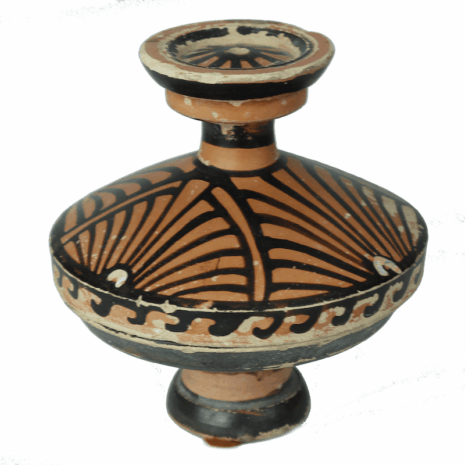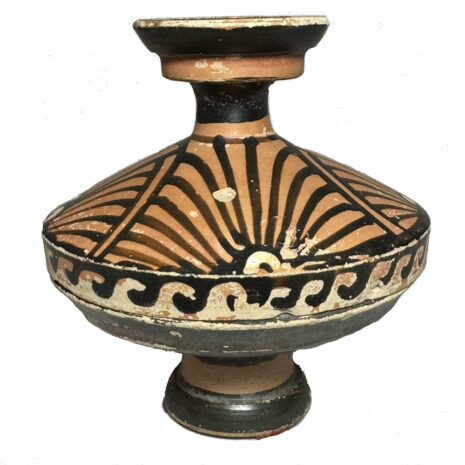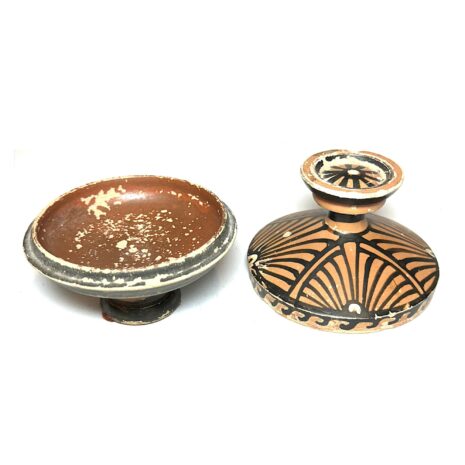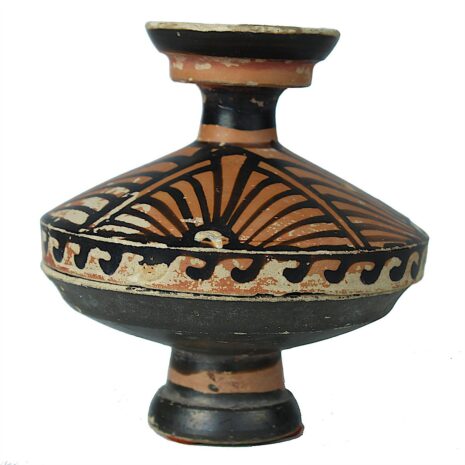Ancient Xenon Lekanis, Magna Graecia, (3247)
Original price was: $595.00.$450.00Current price is: $450.00.
Ht: 3.5” Dia: 3.5” FREE SHIPPING WITHIN CONTINENTAL U.S.
ancient xenon ware lekanis from Apulia in Magna Graecia, Roman name for the South Italy coastal area. With close-fitting top held cosmetics. Considered fine ware, fathers filled them with jewelry for their daughters’ wedding gifts.
Description
This ancient pottery xenon ware lekanis is from Apulia in Magna Graecia, the Roman name for the South Italy coastal area. Colonized by the Greeks in the 6th century B.C.E. Greek settlers arrived with their Hellenic culture intact and greatly influenced Italian civilization.
A lekanis is a highly decorated low shallow bowl with close-fitting top that held cosmetics. Although utilitarian, it was not made for commoners or considered coarse ware and, rather, was fine ware. The characteristic extremely short foot was shaped by carving clay away from the bottom of the body before it was fired. Although utilitarian, A lekanis was not made for commoners or considered coarse ware and, rather, was fine ware. Fathers filled them with jewelry and gave them to their daughters as wedding gifts. Xenon ware pottery style originated in Apulian pottery from the 4th century BC. It is characterized by matte pale orange-red and salmon decoration over a rich black glazed terracotta body fired from red clay.
Painted with pale matte orange-red decoration over a black earthenware terracotta body, this lekanis has a geometric meander across center, a decorative band of tapering vertical lines on the shoulder and a thin line around the lower body.
As usual with such pieces that are more than two millennia old, there is some fading of the painted decoration and small chips in the black glaze around the rim and elsewhere, which reveal the color of the red clay body. However, this piece is in remarkably good condition for its age. For another 4th century piece from Apulia, see item 1368LME.
Presented by fathers to their daughters on their wedding day in ancient times, this tradition would be wonderful to continue in contemporary times.
Additional information
| Weight | 6 lbs |
|---|---|
| Dimensions | 8 × 8 × 8 in |
| Place of Origin | Ancient Mediterranean |
| Period | Ancient, Magna Gracia |
| Date | 4th Century B.C.E. |
| Materials and Technique | Earthenware |
| Dimensions (inches) | Ht: 3.625” Dia: 3.5” |
| Dimensions (metric) | Ht: 9.21cm Dia: 8.89cm |
| Weight | 5.6 oz |
| Condition | Very good, wear consistent with age and use/no restorations/repairs |
| Item Number | 3247BHK |
| Width | 0” to 5.9” |
| Shipping Box Size |








